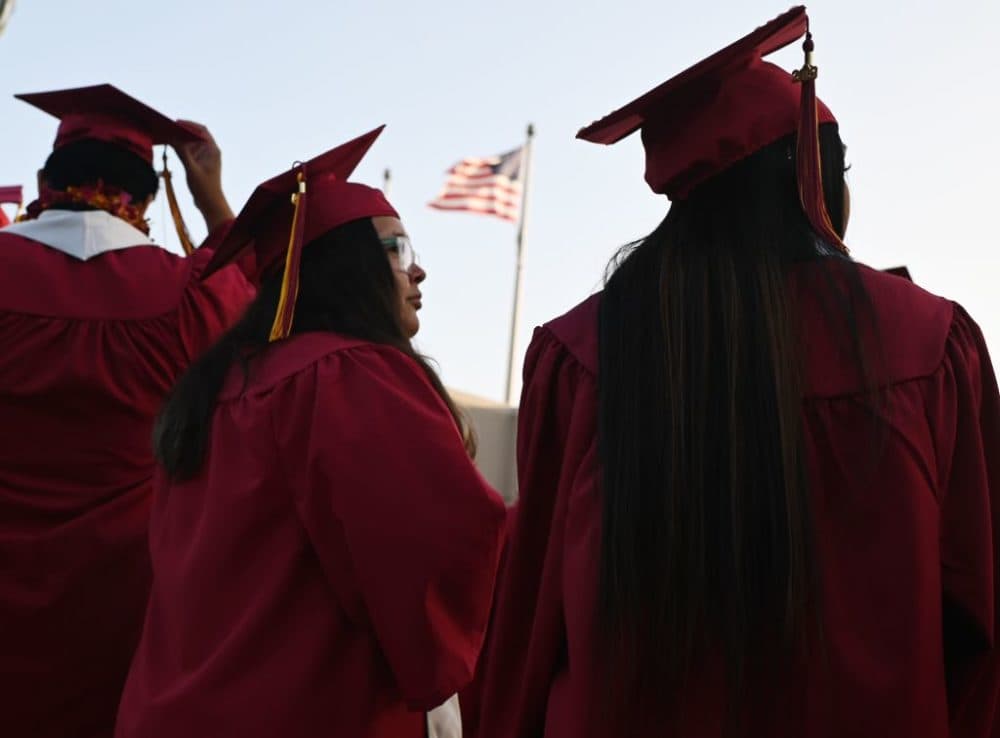Advertisement
As Student Loan Debt Forgiveness Is Considered, Causes Of Debt Continue To Worsen
Resume
Student loan debt in the U.S. totals around $1.7 trillion — more than debt on cars or credit cards.
During the coronavirus pandemic, payments on federal loans were temporarily halted until January 2021. President-elect Joe Biden has said his administration would support some kind of student loan forgiveness.
Kevin Carey, director for New America's education policy, says there are multiple reasons why the U.S. is experiencing an increase in student loan debt.
After the economic and housing downturn from 2007 to 2009 known as the Great Recession, state governments pulled funding out of their public university systems. To make up for the loss, public universities increased tuition, Carey says, and students ultimately took the hit by having to borrow more money.
Plus, he says, many middle and lower-income families lost wealth during the Great Recession and never made it back.
“People didn't have home equity or other sources of savings to draw on, so they had to take out loans,” Carey explains.
The modern-day workforce also puts a heavy emphasis on college diplomas, he says. The demand for high education has surged since “there's really no path to a good career that doesn't require some kind of degree,” he says, whether it be a four or two-year degree.
That means colleges are in an exemplary position to charge higher prices, he says.
The burden of student loan debt isn’t equally shared: There are massive inequities between white students and Black students, he says.
The problem has gotten worse over time, too. Carey points to a report from the Roosevelt Institute that found an increased wealth gap between white and Black recent college graduates from 2000 to 2018.
Black students typically borrow more money to attend college, he says, “because Black households have suffered under a long history of discrimination in our country.”
Take housing discrimination against Black Americans for example, he says. Black families weren’t able to build home equity because they were redlined from certain neighborhoods or charged astronomical interest rates.
“Often, if you have two families — one white, one Black of similar income — the wealth is very different. And people pay for college with their savings, with their wealth,” he says. “And so Black families have had to borrow more to go to college.”
“Predatory” for-profit colleges also aggressively target Black students, he says.
The incoming Biden administration has signaled they are willing to support legislation to help students struggling with debt. Earlier this year, Congress introduced legislation that would forgive the first $10,000 of student loan debt — an initiative Biden recently gave his nod of approval to.
Canceling $10,000 of student loan debt would help the folks struggling the most, Carey says.
“Just by forgiving the first $10,000, we could take care of a lot of people that are in delinquency or in default while not giving too much money to high-dollar borrowers who tend to be people who go to, say, law school or medical school and usually actually can pay their loans back just fine,” he says.
The president-elect is also in support of “very ambitious legislation” that would make many public higher education systems free for those who make less than $125,000 annually while also expanding the federal Pell Grant program for low-income students, he says.
Carey suspects that Biden will face a great deal of pressure to move quickly on matters of student debt, partly to serve as a signal to progressives that he’s acting on college affordability, a key issue to supporters of former Democratic presidential candidate Sen. Bernie Sanders. A divided, Republican-majority Congress might stall or terminate those pursuits, he says.
“I think debt forgiveness would be a way for the Biden administration to do something dramatic, to do something early and signal to the progressive wing of the Democratic Party that it's serious about their concerns,” he says.
But those opposed to student loan debt forgiveness raise valid questions of fairness, he says, both to those who have recently paid off their loans and to future loan borrowers.
“There are some people who believe the Department of Education could actually unilaterally write-down loans since the vast majority of all student loans are held by the U.S. federal government,” Carey says. “But then you're kind of solving a symptom, but you're not solving the underlying problem.”
Doing nothing to address the problem won’t help anyone, he explains, because debt will just continue to pile on and affect the ability of young people to start careers and buy houses. If Americans desire a more informed and educated public, then letting debt compile is “bad policy,” he says.
“I think it's a question of ‘if’ not ‘when’ these reforms will happen,” Carey says. “But making policy in Washington, D.C., is never easy. So when exactly that happens is a little hard to tell.”
Here & Now wants to know: What would student debt forgiveness mean to you? Should everyone be required to pay back their loan debt, regardless of circumstances?
Let us know by clicking here or by filling in the form below. A Here & Now producer may be in touch with you for a future segment.
Alexander Tuerk produced and edited this interview for broadcast with Jill Ryan. Serena McMahon adapted it for the web.
This segment aired on November 23, 2020.

